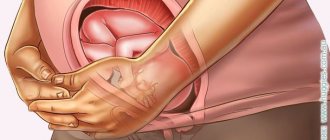Pregnancy Varvara Igoreva 05/14/2018
Hurray! You are at the finish line. Long weeks of waiting, nausea, excess weight, periodic pain, sudden movements of the baby have exhausted you, but now is the time to relax.
- 1 Baby size: height and weight
- 2 37th week of pregnancy. What's happening?
- 3 What to take with you to childbirth?
- 4 Feelings
- 5 Belly at 37 weeks pregnant
- 6 Uterine tone
- 7 Movements
- 8 Nausea at 37 weeks
- 9 Pain in late pregnancy
- 10 Discharge
- 11 37 week. Pregnancy with twins
- 12 Dangers During Twin Pregnancy
- 13 37th week of pregnancy. Harbingers of childbirth
- 14 Precursors in multiparous women
- 15 Caesarean
- 16 Pregnancy at 37 weeks. Adviсe
Baby size: height and weight
During this period of pregnancy, the baby continues to grow. Now his height is about 49 centimeters, and his weight is around 3 kilograms. Due to such a mass of the toddler, movements at the current stage will become more rare. The fetus is already quite strong, but it needs a little more time to fully adapt. During weeks 38 and 39, your baby's brain and lungs will continue to mature.
In general, the baby at 37 weeks of pregnancy is almost fully formed. If for some reason you have to induce labor, this will not harm the health of the baby.
Feelings of the expectant mother and changes in her body
General state. This period is the starting point before the birth of a child. Mommy begins to feel herself in a completely new way, both physiologically and morally. Impatience increases, and frequent questioning, sometimes even of close people, can easily throw you out of a state of psychological balance.
Right now, the hormonal background is actively being restructured, and the birth canal is preparing for the passage of the fetus.
The uterus begins to descend. If you were previously suffering from constipation, now you may experience stomach upsets. But this is only for the good. Everything that is superfluous and unnecessary comes out, which would create additional difficulties during the birth process.
Weight. By this time, women gain an average of 10-13 kg. The fruit itself weighs the most, up to 40%. Approximately the same amount, 10% each, is occupied by the placenta and amniotic fluid. The rest comes from the uterus, breasts, hips, blood and excess fluid. From this point on, weight gain should practically stop. The average weekly norm is 150 grams. A week before giving birth, your appetite may disappear on its own, and you will lose a couple of kilograms.
Pain at 37 weeks of pregnancy can be:
- sharp;
- pulling.
These are some of the main signs that you will soon see your little one. It puts pressure on your perineum, the pelvic bones become softer and begin to separate.
The stomach also becomes hard. One of the reasons is the cessation of uterine growth. Considering the psychological changes and concern for the baby, do not hesitate and seek advice from a gynecologist.
When walking or standing in one place for a long time, discomfort in the legs may worsen. Now you need to take care of yourself and rest more, lie down.
Sex . Previously, doctors recommended abstaining from intimacy. But today the situation has changed dramatically. If you do not have serious contraindications or psychological barriers, then you should not deny yourself pleasure. The main thing is to choose a position that is comfortable for you, so that your stomach does not create severe discomfort. Sperm promotes greater elasticity of the uterus. This, in turn, helps her open up more easily during childbirth.
Discharge. Milky and whitish discharge is considered normal. They can be either liquid or have a mucous structure. Abundant yellowish discharge makes it clear that it is time to immediately go to the maternity hospital. If you notice blood in them, this may be a signal of placental abruption.
What should you be wary of? If the discharge has acquired an earthy, green tint and looks more like pus or has become cheesy, immediately go to the hospital for additional examinations. This may be an alarming indicator of the presence of an infection that needs to be treated urgently so that your child does not become infected with it. If the discharge becomes watery, it means your water has started to break.
What to take with you to the birth?
Do you think there is still a lot of time before giving birth? Your baby may think differently. If the baby suddenly decides to appear earlier, be one hundred percent prepared for this. Now pack your things for the maternity hospital. A robe, nightie, slippers, socks, nursing bra, toiletries, and clothes for the newborn must be in your bag. Also pack what you plan to wear on the day of discharge.
Prepare your home for your baby's arrival. Remember that you are only allowed to exercise moderately. It’s not an option to lick everything and climb on all fours. This position can trigger premature labor. Let you still have a week or two of pregnancy left, or even more.
What to take with you to the birth?
Feel
At such a late stage, pregnant women do not always feel ideal. They are in full swing preparing the birth canal. Women complain of fatigue, slowness, and problems sleeping. Many record weight loss. At the stage of adaptation of the body to childbirth, this is completely normal. Now your pelvis has practically rebuilt itself for childbirth, and your breasts are ready to feed your baby. More and more pain in the lower abdomen. During the current period, attacks of nausea sometimes occur, and in some cases vomiting is possible. During the 37th and following weeks, you may often break into a sweat. More profuse discharge will begin soon. The baby's movements will be felt less frequently. If you are having twins, try to recognize the warning signs of labor. Download the pregnancy calendar, it will help you navigate by week.
Belly at 37 weeks pregnant
At this stage, expectant mothers experience discomfort inside their tummies. There may be several reasons. A strong, mature baby continues to gain weight. This week, the baby is feeling cramped in her mother’s belly. A pregnant woman feels this, especially when the baby is in a playful mood. Because of the baby's pushes on the tummy, a woman sometimes experiences pain.
With the increased weight of the baby, it becomes more and more difficult for the mother to walk. The skin of the abdomen becomes tense, and unpleasant sensations of itching and even pain may occur. The body itches, the navel transforms.
At 37 weeks pregnant women may experience a drooping belly. For those pregnant with their first child, this occurs several weeks before giving birth. For multiparous women, just before birth. During the process, women often feel that their stomach is pulling. This means that the process of training the uterus for childbirth has begun. Get ready for a mega-important day. If it pulls below, the moment of meeting the child is very close.
Belly at 37 weeks pregnant
In some of the 37th week of pregnancy, attacks of heartburn gradually disappear. Finally! The absence of unpleasant sensations significantly brightens up the days of waiting for childbirth. The uterus is now below and ceases to put pressure on the stomach and diaphragm. On the one hand, it becomes easier, but new symptoms appear. Sometimes it starts to feel nauseous.
The uterus has descended and begins to put pressure on the bladder. Frequent urges will irritate both day and night. But still, try not to be nervous before giving birth. Stay calm no matter what happens.
Every woman's body prepares for childbirth in its own way. Therefore, not everyone’s stomach drops. This is also the norm. At this stage, the woman feels her body and notices the slightest transformation. Sometimes the expectant mother complains of a strange feeling of petrification in her stomach. It is quite possible that this is uterine tone or false contractions. Talk to your doctor and make sure your baby is okay.
Monitoring fetal movements before birth
However, even now movement control must be further carried out. A too sharp decrease in their number may be an alarming sign. Tell your doctor if your baby makes itself known no more than 3 times a day.
You should not worry if you notice an increase in the activity of the fetus before childbirth: it is also preparing for upcoming events, and, by the way, its movements are now taking on a rotational-translational nature, doctors say. But here you should also listen to the signals from within and be able to interpret them correctly: is the baby playing or warning about danger? Sometimes it happens that a child experiences oxygen starvation before birth. One of the signs of hypoxia may be excessive activity of the fetus before birth.
If you resort to numbers, then approximately you should feel at least 10 fetal movements in a 6-hour period or at least 24 in a 12-hour period. In one hour, the baby normally moves twice or twice, but doctors do not recommend an hour-long observation as an indicator, since the baby may be sleeping.
Read more Removal of mortgage encumbrance from an apartment deadlines
Any movement or episode of tremors that you feel should be considered movements. If it seems to you that your baby has been quiet for a long time, try eating candy or drinking a glass of milk and lying on your left side. This position is considered uncomfortable for the fetus - and he should let you know about it. Also remember that all babies are different, so both high and low fetal activity before birth may be normal.
But if something bothers you, you should consult a doctor. If during the examination the gynecologist told you that everything is fine with the baby, then there is no reason to worry about frequent or weak movements.
There is no need for unnecessary worries now. Rest assured: the baby is almost ready to meet you. Even if there was a need to induce labor a little earlier, this would not have a negative impact on his health. On the contrary: sometimes such a decision is the most correct, because it is made in the interests of the baby. So there is no need to worry at all: the stress hormone before childbirth is absolutely of no use to the little one or to you.
Another week has passed, and now you are in full combat readiness. Things have already been collected for the maternity hospital, everything is prepared to welcome the baby.
Childbirth at the 37th week of pregnancy ends safely, the baby is born full-term, its organs and systems are fully formed and function normally outside the mother’s body.
The further period of pregnancy is accompanied by the maturation of the nervous system, the final preparation of the respiratory apparatus for independent breathing, although even at this stage enough surfactant has been formed, the lungs fully open with the first breath.
How many months have passed? The 37th week is the beginning of the tenth obstetric month of pregnancy (one obstetric month has exactly 28 days, or 4 weeks).
The weight of a child at 37 weeks of pregnancy is about 2.9 - 3 kg, and his height is 47 centimeters.
Uterine tone
Even at a decent period of 37 weeks, uterine tone is possible. The reproductive organ increases significantly during pregnancy, so its muscles contract. Also, tension in the uterus is possible due to a better supply of blood to the pelvic organs during gestation.
Childbirth is in the near future, the little one has grown up. And the reason for the tone of the uterus may even be the size of the baby. During this period, the stronger baby takes up space in the lower abdomen and puts pressure on the uterus.
Uterine tone at 37 weeks of pregnancy is also possible due to the abnormal structure of the organ itself. Tone is usually accompanied by oligohydramnios and polyhydramnios. Future birth is an exciting event. Constant worries provoke muscle tension, so the uterus can be in good shape. Problems with the intestines are also dangerous. Constipation is one of the reasons for tone. Uterine contractions are possible due to colds, flu, and ARVI.
Childbirth at 37 weeks of pregnancy occurs quite often. This means that tone sometimes plays the role of a harbinger. Be on the lookout! It is quite easy to identify the tone. You will feel a pain in your lower back and a tightening in your lower abdomen.
Movements
Due to the lack of room for maneuvers, the baby moves less often than in previous weeks of pregnancy. It is necessary to clearly monitor the movements of the toddlers. It is the presence of movements, their nature and quantity during each week that makes it possible to determine the condition of the fetus.
Movements
Timely detection of abnormalities reduces the risk of serious complications during childbirth. Sometimes the expectant mother feels very active movements, feels pain because of this, and sometimes records minimal mobility of the baby. In any of the options, it is better to see a doctor. If there are no movements at all, you need to go to the doctor immediately.
Nausea at 37 weeks
Expectant mothers are sometimes bothered by nausea at 37 weeks of pregnancy. Here are the reasons why toxicosis occurs in late pregnancy:
- Until the abdomen drops, the uterus puts strong pressure on the stomach.
- A feeling of nausea may be a sign of the onset of a cold. Take care of yourself. Now is definitely not the time to be sick.
- Poisoning of the body. Nausea, vomiting and stomach upset are a set of symptoms that require a trip to the hospital.
The doctor will prescribe a series of tests. It is important to understand what exactly causes the feeling of nausea. The most important process is just around the corner - childbirth. Be especially careful at this stage of pregnancy. notice everything, pay attention to whether there are movements.
Even if you only feel sick periodically, still run to the doctor. Accurate diagnosis is necessary to ensure that the child is ultimately healthy.
If they tell you that the very process of preparing the body for childbirth causes nausea, then there is no reason to worry. Try to relieve unpleasant symptoms.
Nausea at 37 weeks
To help get rid of nausea during pregnancy:
- Eating food in small portions. Due to overeating, the stomach, on which the uterus presses, will suffer even more.
- Avoiding difficult-to-digest foods will help you cope with nausea. Your ideal option is steamed dishes. The child will thank you for them.
- A reliable helper against nausea is mint or lemon balm tea.
Frequently asked questions on the forums
1:
Q: 37 weeks pregnant, why do the bones between my legs hurt?
A: To facilitate childbirth and the advancement of the fetus along the birth canal, at the end of pregnancy the pelvic bones move apart. This happens under the influence of hormones, the bones soften a little and move apart. At this time, the pelvis experiences enormous stress from the child. Long walks increase tension in it, which leads to pain.
2:
Q: Is it possible to take a bath at 37 weeks of pregnancy?
A: You can take a bath, but only a warm one, not a hot one. The water temperature should be no higher than 37 degrees. Lying in water for a long time in the later stages is also not recommended; 10-15 minutes will be enough.
3:
V.: 37 weeks, the baby is very active. They say that activity should decrease by this time, is it normal that this does not happen?
A.: A decrease in the activity of the baby’s movements in the later stages is a common occurrence, but not a dogma. If the child is still as active as in earlier stages, this is normal.
Pain in late pregnancy
Childbirth is just around the corner and the body is in a hurry to “arrange” everything for the comfortable birth of the baby. During this process, the woman may feel pain. They are periodic and are mostly normal at the current stage of pregnancy.
Many people experience false contractions. At 37 weeks, they last longer and cause more discomfort than before. Pain appears in the abdomen, back, and groin. Expectant mothers sometimes even feel like labor has begun. In fact, this is how the body checks whether the tone is in order.
When the stomach drops, a number of changes occur. The baby's head puts pressure on the pregnant woman's pelvis, muscles and ligaments.
A few weeks before giving birth, women may complain of pain between their legs. This is a very unpleasant feeling. The pain is specific, shooting in nature and indicates divergence of the hip joints.
Sometimes the child puts pressure on the mother’s sciatic nerve and causes severe pain. In such a situation, it is not easy not only to stand, but also to lie down. A feeling of relief can only appear if the child changes position. Although often the pain goes away only after childbirth.
Food also affects your well-being. Due to an improper nutritional system, pain in the intestines often radiates to the perineum. The feeling is not pleasant. To avoid pain, eat small portions of food. Eat 5-6 times a day. Thanks to this, nausea at 37 weeks of pregnancy will also disappear.
Very sharp pain in a pregnant woman can be a sign of appendicitis, which is also indicated by nausea, vomiting and fever. Painful contraction of the muscles in the lower abdomen in tandem with cramps often indicates the onset of premature labor. If they happen at this time, everything will be fine with the baby.
Do you experience severe nagging pain or any other symptoms? Pull yourself together! Do not panic. Don’t think too much, go for a consultation with a doctor and make sure everything is fine. The body that is expecting childbirth can react in different ways. The occurrence of unusual sensations does not always indicate something bad.
What's happening to the baby? Fetal development
At week 22, the weight of the fetus is approximately 400-430 grams, and its height is 26-27 cm. In the near future, growth will slow down, and weight, on the contrary, will increase. This is still a tiny, but already almost fully formed little man. The arms and legs become proportional to the body, small fingers are covered with marigolds, eyebrows appear, which are still very light due to a lack of melanin. His facial muscles are quite developed, thanks to which he already grimaces and frowns.
In addition, during this period, important processes occur in the child’s body:
- The spine is almost completely formed.
- The nervous system is improved.
- The stomach and intestines are actively developing, and the lungs are preparing for work.
- The brain functions perfectly: the baby consciously thinks, analyzes his feelings, reacts to his mother’s touch, her voice, and feels her mood.
- This is a time of active tactile cognition: the child can touch his face, arms and legs, knock on the walls of the uterus, and suck his finger.
How does the baby move?
The size of the fetus is still small enough that it can feel free in the mother’s belly. The baby naturally takes advantage of this, making up to 200 movements a day. He kicks, pushes with his arms and legs, rolls over, and learns to coordinate his movements.
Mom, of course, cannot feel all the movements, but she notices the most significant of them. Normally, a woman should feel movement throughout the day. In this case, periods of activity should be replaced by rest.
Too frequent and violent movements may mean a lack of oxygen, tell your doctor about this and get outside in the fresh air more often. If there is no movement during the day, immediately go to the doctor. He will check the fetal heartbeat and order an examination to determine the cause. Do not hesitate to visit a doctor, because the absence of baby movements may be a symptom of a frozen pregnancy. Although this is a rare occurrence at such a time, it is still better to get checked.
How does the child feel?
At 22 obstetric weeks, the baby already feels everything around him. It detects light and reacts to sounds that are too loud and harsh. Many mothers note that with loud sounds, the baby may begin to kick in the stomach. Talk to him quietly, sing songs, listen to pleasant music: he will listen to it with you.
The baby also reacts to touch. He likes belly rubs. Be sure to rub your belly when talking to your baby.
The child is very closely connected with his mother, not only physically, but also emotionally. He feels all her experiences, worries and joys. Try to protect yourself from negative emotions. Visit exhibitions, walk, go shopping, communicate only with those people whose conversations lift your spirits. A positive mental attitude is important for a child.
Discharge
At 37 weeks of pregnancy, the discharge is ideally whitish, homogeneous, slightly mucous with a sour aroma. Pathological discharge (such as thrush) is not characteristic of late pregnancy. They are usually treated before labor begins.
Colorless discharge and discharge with pinkish mucus indicate the passage of the mucus plug. In the body of a pregnant woman, it prevents harmful microorganisms from entering the uterus. If you have similar watery discharge, it means that moment X is approaching. But the removal of the plug does not guarantee that labor will start right away. It may take several hours or even days. It is not recommended to have sex from the moment the plug comes out until childbirth. The nature of the discharge in the later stages says a lot about the condition of the expectant mother. The quantity, color, smell, and consistency should be normal.
Sometimes at 37 weeks blood appears in the discharge. This is a reason to urgently consult a doctor. In some cases, bleeding appears after the plug comes out. This may indicate future complications.
Questions - answers
I'm 37 weeks pregnant and my stomach feels more and more frequent. This is fine? Is this a sign that labor is about to begin?
An increase in the frequency of training contractions, which women usually describe as a feeling of tension in the abdomen, may indicate impending labor. But if you have your first birth, and there are no other precursors (prolapse of the abdomen, passage of the mucus plug, etc.), then labor may begin in two to three weeks. If contractions become very frequent and painful, be sure to consult a doctor.
This is my first pregnancy, 37 weeks. My legs hurt more and more, my lower back feels very tight, and sometimes my pelvic bones hurt. What is this?
Such sensations are quite normal in the last weeks of pregnancy. Pain in the legs is associated with compression of the venous vessels and nerve plexuses by the uterus. They are not dangerous either for you or for the baby, but they do often cause concern. Try to get more rest, ask your relatives to massage your feet, and only wear comfortable shoes. Increased pain in the lumbar region, in the pelvis is probably due to the fact that the stomach has already dropped, and the baby’s head is now in the small pelvis, while the pelvic bones move apart, the sacrum moves back somewhat, which causes pain.
At 37 weeks of pregnancy my weight increased by 17 kg. I try not to eat much, but I’m afraid that I’ve gained too much. This is not dangerous?
The normal weight of a woman in labor is very important for the course of labor. 17 kilograms is slightly higher than acceptable, but not critical. You still have 2-3 weeks ahead, and it depends on you how the birth will go. Limit all sweets and bread products, try to consume more vegetables, fruits, cottage cheese, and lactic acid products. It is important to know that weight is not gained due to edema. If you feel normal and the weight has been gained gradually, there is no reason to panic. If you notice that you have gained weight very quickly, literally in a week, be sure to consult a doctor.
Dangers during pregnancy with twins
In the third trimester, pregnant women with twins may be at risk of miscarriage. Often the culprit is tone. Women experience severe pain in the lower abdomen and back pain. When this happens, the doctor prescribes treatment. Thanks to special medications, the uterus relaxes during this and subsequent weeks of pregnancy. To have a cesarean section or to give birth naturally is usually decided during this period.
Twins and twins may come into this world weakened. Even if the babies weigh less than two kilograms, they will be able to leave. The main thing is not to be nervous. The babies will quickly gain weight and get stronger. Twins are rapidly catching up in development with their peers who matured alone in the belly. Nature itself took care of this. Twins have a much higher ability to adapt after childbirth.
Very soon your little ones will grow up. And you will be surprised how they fit inside your belly.
Precursors in multiparous women
During the first pregnancy, warning signs appear two or even three weeks before birth. For multiparous women, the situation is a little different. If a woman already has children, the warning signs can begin in as little as 24 hours.
Precursors in multiparous women
In multiparous women, the precursors differ slightly in character and intensity. Week 37 is a comfortable time for the onset and pronounced manifestation of symptoms. Please note the following:
- In multiparous women, the lumen of the uterus is wider, so the harbingers of labor are much brighter.
- After previous births, the cervix of multiparous women remains slightly open. Therefore, before the second birth, it opens faster. The removal of the mucus plug is the first warning sign.
- Women experience more abundant discharge during the final stretch of pregnancy.
- Contractions preceding labor begin earlier in this case.
- Diarrhea, nausea, urge to urinate.
- Weight loss.
- As for multiparous children, they are often born from the 37th week. Pregnant with your second or third baby, usually over thirty. They treat pregnancy especially responsibly.
Caesarean
At the current stage, in multiparous women and in pregnant women with twins, labor can begin at any time. In certain situations, the optimal solution would be a cesarean section at 37 weeks of pregnancy. Indications for surgery include breech presentation of the baby. In the case of twins, a caesarean section will probably be ordered even if only one of the babies is in the wrong position.
The main task now is to reduce the risk during childbirth. Both the doctor and the expectant mother should understand this. By the way, in some hospitals natural births of breech babies are prohibited. Another reason to do a cesarean section is polyhydramnios or oligohydramnios. A woman’s pelvis that is too narrow is the next sign of an upcoming operation. Excessive weight of the baby is also a reason for cesarean section.
If a woman has had a cesarean section more than twice, the third birth cannot be natural.
Harbingers of childbirth
Since labor can begin at any time, a woman should know the signs of impending labor. The 38th week of pregnancy has obvious warning signs. Therefore, an attentive woman always has the opportunity to contact specialists in a timely manner.
The 38th week of pregnancy is always associated with frequent false contractions. Thus, the uterus is prepared for labor. Sometimes they become very painful. The abdomen often becomes hard and there is severe lumbar pain. If, after a change in body position, uterine contractions do not subside, then this is evidence of the onset of labor.
When your stomach doesn’t feel too tight at 38 weeks of pregnancy, you should definitely pay attention to other symptoms. Rapid labor often occurs during the second pregnancy.
This process is dangerous and threatens birth injuries for the child. Therefore, if during your second pregnancy your lower back hurts and your stomach begins to ache, it is better to go to the maternity hospital. At 38 weeks of pregnancy, warning signs of labor may appear as follows:
- Stopping or reducing a woman's weight by about a couple of kilograms.
- Long-lasting tone of the uterus, as well as the fact that at 38 weeks of pregnancy the stomach becomes stone.
- Increased frequency of urination due to the fact that the pressure of the uterus on the lower abdomen increases.
Among the psychological precursors of childbirth at 38 weeks of pregnancy, experts note a woman’s desire to restore order in her own home. Despite the aching pain in the abdomen and even a trace of blood in the discharge, she begins to do general cleaning. Psychologists call this behavior immediately before childbirth the “nesting” effect.
Pregnancy at 37 weeks. Adviсe
- Download the pregnancy calendar.
- Find out how childbirth goes. Get answers to all your questions. Just in case, find out how to prepare for a caesarean section.
- Now decide on the maternity hospital and the doctor who will deliver the baby.
- Decide whether you want someone to support you during labor.
- Nagging pain is a reason to visit a doctor. Make sure the uterus is not toned. Especially if there is a strong pull in the lower abdomen and lower back pain.
- Choose the right sleeping positions. Don't rest on your back. In this position, the weight of the uterus will press on the aorta.
- Remember that if you are expecting twins, your water may break as early as 37 weeks. The same applies to multiparous women.
- Don't be afraid of contractions. Childbirth at 37 weeks' gestation is no longer considered premature.
- Weight loss is normal. Don't sound the alarm.
- Take care of your health. There should be no blood in your discharge.
- Take a walk accompanied by your loved ones. Before giving birth, it is better to avoid walking alone.
- Get regular checkups. During this week, the ideal height of the uterine fundus is 37 cm. A significant deviation from the norm may indicate oligohydramnios or polyhydramnios.
- If you feel nauseous, try to eat often, but in small doses.
- Notice the pattern of fetal movement. Pay attention to the number of these movements. Keep in mind that shortly before giving birth, the baby does not toss and turn as often.
- Are you having twins? Eat healthy meals every day to help your children gain weight well.
- Caesarean is not a death sentence. Do not insist on spontaneous childbirth if there is a risk.
- Remember the last weeks of pregnancy, take photos. A drooping belly will relieve you of many unpleasant sensations and allow you to enjoy the anticipation of meeting your little one.
- Harbingers are your friends! Listen carefully to your own body, especially at the end of pregnancy.
Pregnancy at 37 weeks. Adviсe
And no matter how hard it is for you, remember - everything will pass: discharge, excess weight, pain below, and nausea. Childbirth will change a lot both physically and mentally. Don't get mad about the huge size of your belly right now. You may not be able to tie your shoelaces yet, but in a couple of weeks or even sooner you will feel like the happiest person on the planet. Very soon you will hold a baby in your arms, who will teach you to love even more.
Necessary studies and analyzes
If you have a doctor's appointment this week, be sure to take a urine test first. If before this you had a decrease in hemoglobin, then a blood test could also be prescribed for you. These are the two most common tests that a woman has to undergo during pregnancy.
During your appointment, the gynecologist will ask you about your health and be sure to check how much your body weight, the height of the uterine fundus and abdominal circumference have changed. It is also necessary to listen to the fetal heart beat. They will also measure your blood pressure, because towards the end of pregnancy doctors pay very close attention to weight gain and blood pressure readings of a pregnant woman so as not to miss the appearance of the first signs of gestosis.








